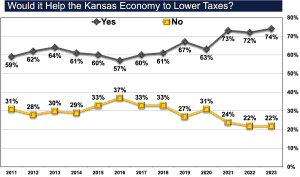Kansas students can graduate from high school without taking any classes on personal finance. A bill before the Kansas Legislature would change that. The proposal mandates that Kansas high school students pass a semester-long class on personal finance in order to graduate. However, opponents of the bill, including the Kansas Association of School Boards (KASB) and the Kansas National Education Association (KNEA), argue the proposal breaks trust with local school boards.
“Our kids are coming out of school almost illiterate in terms of how to deal with their finances,” Walt Chappell, a former member of the Kansas State Board of Education and education consultant.
Currently, Kansas high school students must complete three units of geometric and algebraic concepts in order to graduate. A semester course is a half-unit. The standards do not address exactly what those classes might be. For a typical student, that might include Algebra I, Algebra II and Geometry classes. A state law, passed in 2003, encourages local districts to teach some personal finance concepts as part of math or social sciences curriculum, but only about 26% of students receive the training.
“Simply put, if a course is not required or tested, it does not get taught,” Chappell said.
Few students required to take personal finance classes
According to the Council for Economic Education, all 50 states and the District of Columbia include personal finance standards in their curriculum guidelines. However, only 21 states mandate that students take and pass a class on the topic to earn a high school diploma. Approximately 83% of U.S. students are not required to take a finance class in order to graduate.
However, Mark Desetti, a lobbyist for the KNEA told lawmakers on Tuesday that mandating a class will not address the real reasons people appear to be financially illiterate.
“We need to address low wages, college debt, and predatory lending/credit practices if we really want to tackle the problem,” Desetti said in written testimony.
Dave Trabert, CEO of Kansas Policy Institute and the Sentinel, says Desetti is ignoring the underlying issue to many of those problems.
“Kansas school districts give high school diplomas to a lot of students who are below grade level in reading and math, but KNEA predictably wants to deflect from that very serious issue. The 2019 state assessment shows 41% of 10th-graders in Kansas are below grade level in math, and 34% are below grade level in English language arts. Anyone who leaves high school not being able to proficiently read or do math will understandably struggle with personal finance, let alone being able to land a decent job.”
Research shows benefits of financial literacy courses
Research by Carly Urban and Christina Stoddard, professors at Montana State University, suggests arming high school students with financial information results in better decision-making. Their study found that students required to take a financial literacy course choose lower-interest loans and have less credit card debt.
“With the rise of student loan debt, there is concern that student borrowers are not fully informed when making decisions about how much to borrow and from where,” they write. “Can state-required financial education in high school provide the necessary tools to make a more informed decision? Yes — results show that when students receive financial education, they borrow more sensibly, shifting from high-cost to low-cost.”
The knowledge also decreased the likelihood of holding credit card balances and taking out high-cost private loans for college.
“For students from lower-income families, financial education reduces their need to work while enrolled (in college), which likely increases their probability of graduation,” they write. “While the graduation requirements positively affect borrowing behavior, they do not change where or whether students choose to go to school.”
School boards argue for local control
G.A. Buie, a lobbyist for the KASB, told Kansas lawmakers that class delivery matters.
“Local school districts can handle how the delivery should be pushed forward,” he said. “Maybe it’s not a class. Maybe it’s embedded. I think those are the challenges we have as an organization as we look at the requirements.”
Deena Horst and Ben Jones, state school board members, submitted written testimony urging lawmakers to leave that decision to school board members. They warned lawmakers “may have other priorities.”
“Leaving the decision to local districts on how to deliver education in their communities benefit all involved as each community has different challenges,” they wrote.
Chappell, a former state board of education member himself, said there should be no more excuses. The proposal will benefit all students by making sure they learn how to manage money before they leave high school.
“By preventing thousands of Kansas students from learning how to manage the money they earn, the Legislature is setting them up to be in debt as soon as they graduate from high school,” Chappell said.



